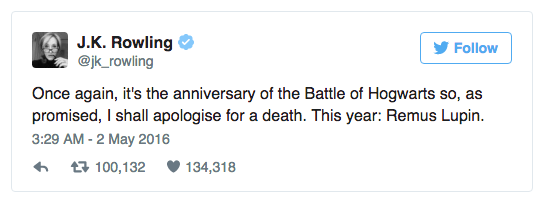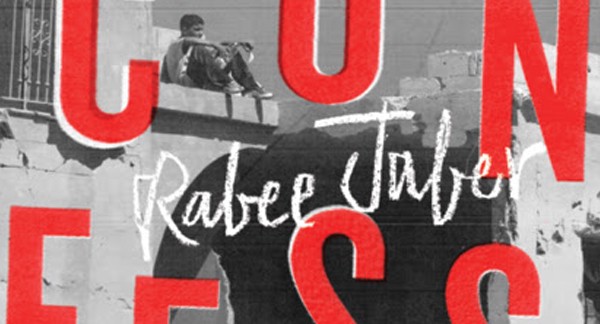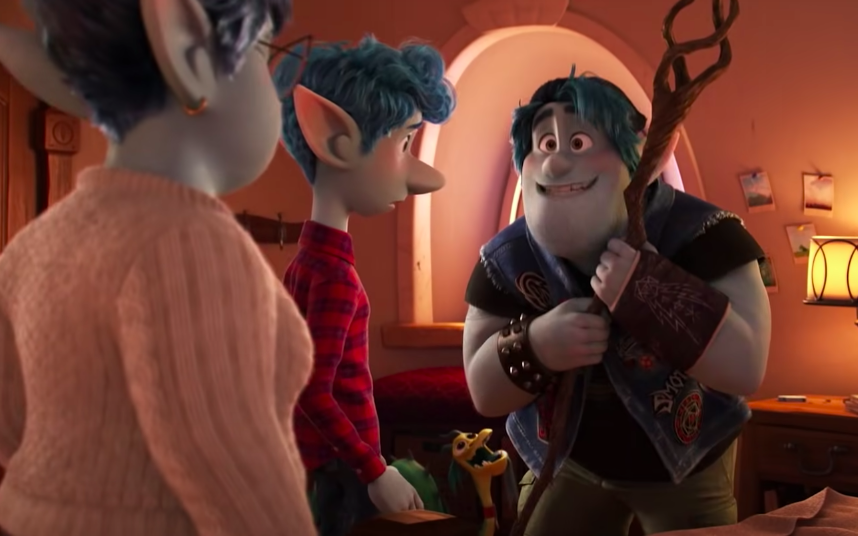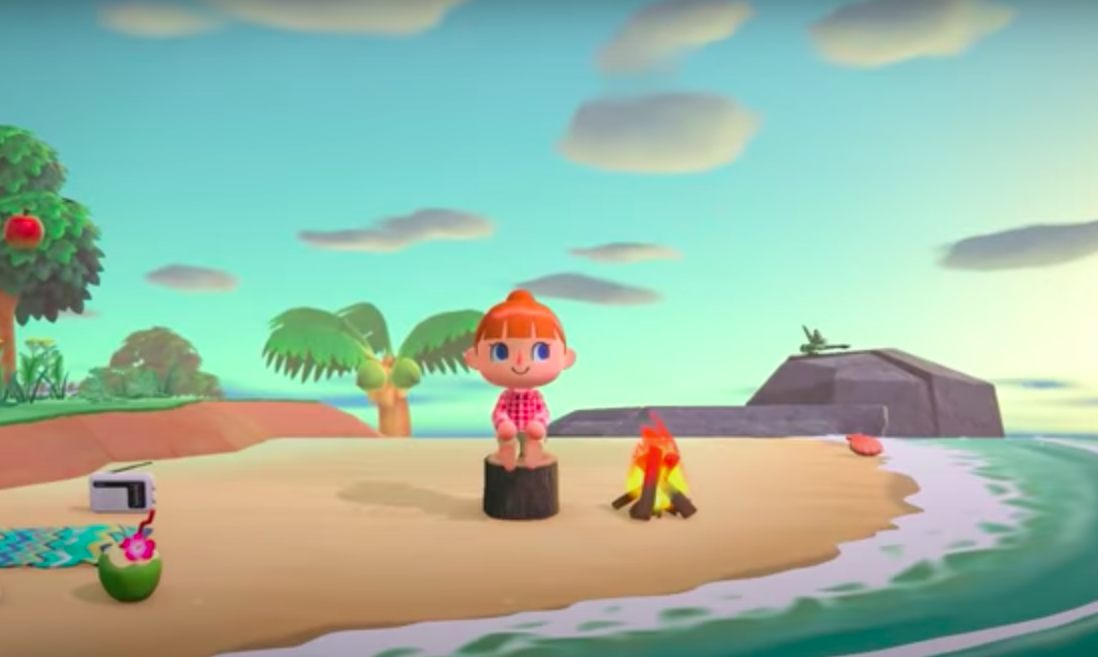Books & Culture
Can Anyone Stop J.K. Rowling From George Lucas-ing Harry Potter?

2017 update:
OK, here it is. Please don't start flame wars over it, but this year I'd like to apologise for killing (whispers)… Snape. *runs for cover*
This week, J.K. Rowling took to Twitter to apologize to Harry Potter fans:

Rowling has made a tradition out of apologizing for fictional character deaths on May 2nd, the date of the big final battle in the Harry Potter series. On it’s own, this is a harmless and fun engagement with fans, but it fits into a weird yet clever pattern of Rowling almost weekly offering apologies or revisions to her fantasy series that supposedly ended nine years ago.
Rowling has previously apologized for her mistake in not marrying Hermione to Harry,announced that the wizard Dumbeldore was gay, retroactively added Jewish characters to Hogwarts, revealed wizarding schools around the world that didn’t make the books,released a string of Harry Potter sequel stories full of “revelations,” and in general kept a steady drip of Harry Potter “news” to keep the book world constantly talking about the nearly decade old series.
And that’s not even counting her Harry Potter sequel play-turned-book and planned prequel trilogy of films.
Of course, Rowling is not the first creator of an epic fantasy series who couldn’t stop adding to and tweaking it. J.R.R. Tolkien rewrote a key scene in The Hobbit to fit the story he planned for The Lord of the Rings, Stephen King revised the first book of his Dark Tower series to fix continuity errors, and George R. R. Martin has been delaying finishing book six of A Song of Ice and Fire by writing prequel novellas and a compendium encyclopedia. But Rowling’s meddling goes beyond a few continuity tweaks or dawdling, and is more reminiscent of George Lucas’s revisions to his epic fantasy-in-space Star Wars films. Like Rowling, Lucas kept feeling he’d done things wrong and needed to “fix” his beloved creation…or at least realized he’d make a lot of bank doing so.
It’s interesting that in contrast to George Lucas, Rowling has mostly been praised for her after-the-fact meddling. Part of this is because Rowling is often addressing a major issue in her books: a lack of diversity despite a sprawling cast. There’s something admirable about wanting to correct that, while there’s nothing noble about adding horrible whimsical dance numbers to Star Wars. And Rowling has avoided making changes to the actual text itself, unlike Lucas and his digital insertions. On the other hand, many have noted how odd it is to give Rowling credit for diversity that doesn’t actually exist in the books. If she wanted to have gay characters or a more divers student body, she would have done far more good putting that in the actual books. It’s more interesting and important that a black actress was cast as Hermione in an actual play than that Rowling tells us Hogwarts was theoretically diverse but she didn’t get around to showing those characters on the actual page.
(I’ve heard people argue that “it was a different time” when Rowling wrote the Harry Potter books and she couldn’t possibly have been published if her books included gay characters or non-white major characters. But the Harry Potter books were published between the late 90s and late 00s, not the Dark Ages and if ANY author had the power to do whatever she wanted it was Rowling after the Harry Potter books had become the most talked about and bestselling fantasy books in generations.)
I also wonder if the different receptions to Lucas and Rowling is a matter of timing. Star Wars was a major force in the creation of modern geek fandom, but things were very different in the 70s and 80s, and still different in the early aughts of the prequel releases. A fandom culture that was obsessed with “canon” and trivia memorization has given way to a culture dominated by online commentary, fan theories, and original fan fic tales. Fans aren’t just expected to read and love a work, but to write meta essays on the series and then create their own art or stories about what they wish had happened differently. Fans are expected to meddle. In this context, Rowling is just another fan dismayed at the author’s mistakes — she called her decision to marry Hermione to Ron a lazy form of “wish fulfillment” — and offering her own additional “crazy fan theories” about the books.
However, Rowling isn’t just a fan. Her unending stream of Harry Potter news functions as brilliant marketing for her products. It works in the same way as the endless stream of casting news, teaser trailers, and rumors that help propel Marvel and DC films to the top of the box office. For years we’ve been constantly told how we are living in the age of the fan where, after publication, the book is entirely the hands of the fans who control meaning, discussion, and reception. Many authors say this bluntly, such as viral YA star John Green: “[My books] belong to their readers now, which is a great thing–because the books are more powerful in the hands of my readers than they could ever be in my hands.” Rowling shows this techno-Barthes dream to be an illusion. In the modern age, the author — or corporate brand like Marvel or DC — still drive the conversation, and have proven remarkably effective at channeling fan interest into further marketing for films and books. Comic Cons are increasingly less a place for fans to gather and discuss their favorite overlooked works, and more places for massive corporations and bestselling authors to kickstart marketing efforts.
But good marketing doesn’t necessarily make good art, and fans have shown themselves plenty willing to abandon soulless corporate cash-ins if they drag on too long. It was Lucas’s three disastrous prequels that — combined with the “Han shot first!” fan backlash — set the stage for him to sell the whole damn franchise to Disney. Rowling hasn’t gotten to that point — her prequel films haven’t even come out yet — but she’s already started to experience major pushback for her recent subpar Harry Potter world writings. If she’s not careful, she might George Lucas the entire thing to death.









